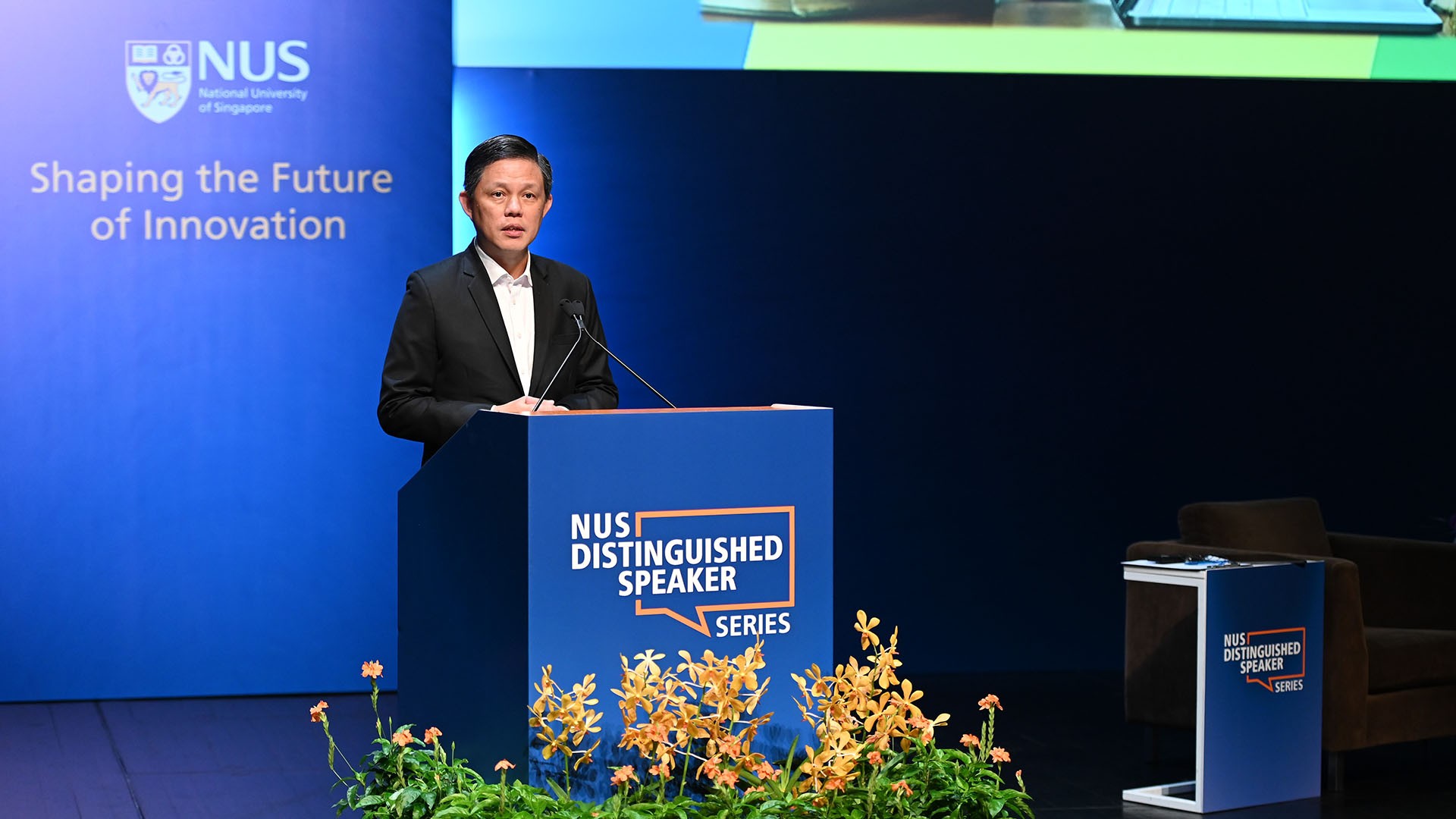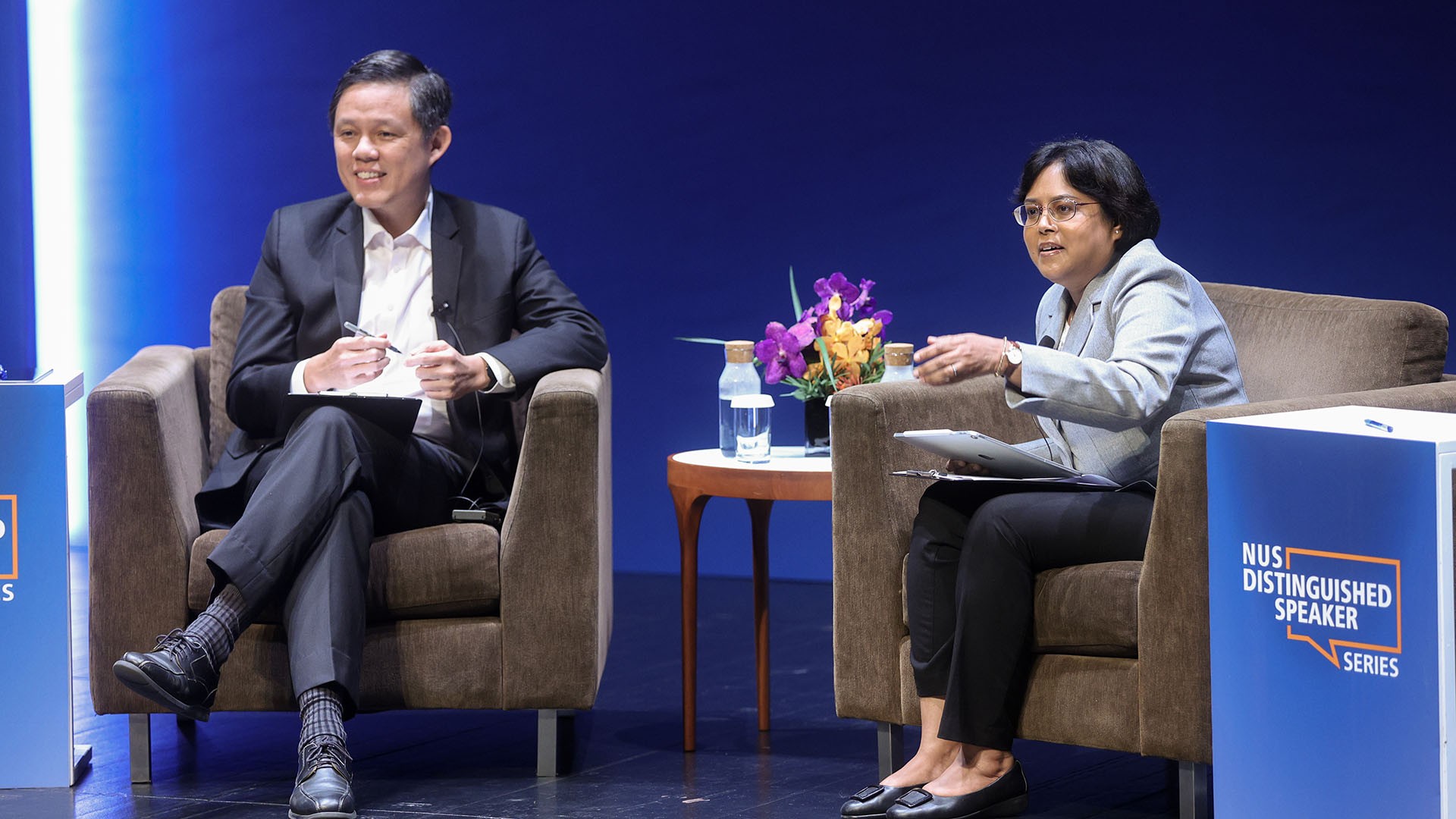Education Minister Chan Chun Sing outlines three ways universities can support Singapore’s innovation drive

As the brain trust of societies, universities like NUS play an important part in supporting Singapore’s innovation drive – and it can do so by contributing its efforts in the three key pillars of connectivity, technology, and policy, said Minister for Education Chan Chun Sing at the inaugural session of the NUS Distinguished Speaker Series on 26 September.
To engender greater innovation on the connectivity front, universities should seek to be a trusted platform for talent from all over the world to work together, learn from each other and create new ideas. He noted that there was tremendous opportunity at this time in history amid an increasingly fragmented world where trust becomes a premium.
This, therefore, presents Singapore with a strong foundation as the nation is seen as an honest broker that can provide a neutral platform for people of different persuasions to come together and interact. “How do we connect with people all around the world? That will define our competitive advantage. How we build talent networks will require a lot of innovations on our part,” said the Minister, who was addressing questions during a Q&A session moderated by NUS Professor Tulika Mitra, Provost's Chair Professor of Computer Science and Vice Provost of Academic Affairs.
Mr Chan had earlier delivered a speech titled “Shaping the Future of Innovation” to kick off the series, which brings together compelling speakers to share their unique perspectives on pressing issues of the future that affect Singapore, the region and the world under the overarching theme “Shaping the Future”.

In terms of technology, Mr Chan said universities like NUS can do more to translate research and innovation into enterprise. But this will require them to better link up with the market ecosystem.
“I think there’s still much that we can do to strengthen our research and innovation and enterprise ecosystem…We’ve done well and I think we’ll continue to improve but there’s still so much we can learn from other ecosystems around the world,” said Mr Chan.
Supporting Singapore in policy innovations
Beyond technology and connectivity, universities can also play a role in developing policy innovations to address the nation’s challenges in areas such as education, healthcare, housing models and information rules. Faculties in NUS and other educational institutions can collaborate to contribute solutions that are adapted to the local context.
In education, for instance, the challenge would be to find new education and training models to support the upskilling and reskilling needs of the nation’s adult population. Meanwhile, in healthcare, policy innovations to encourage people to stay healthier will be needed due to medical advances available, longer lifespans and rising treatment costs.
Mr Chan emphasised that for the benefits to be reaped holistically, innovation must progress on all three fronts concurrently as each mutually reinforces each other. “Technology, connectivity, policy and organisations - if we only progress on any of this one front alone, we won’t get the full impact of it,” said Mr Chan. “If we are determined to make sure that all the different areas progress roughly at the same speed (and) mutually reinforce one another, then I think we’ll do much better than many other societies.”
Speaking during the welcome remarks, NUS Acting Provost Professor Bernard Tan, shared how the University seeks to incorporate innovation in its educational mission. One way is through the NUS Overseas Colleges (NOC) programme, which allows students to take up internships at start-ups in leading entrepreneurial hubs around the world.
“This valuable experiential learning has given many students an innovative mindset,” said Prof Tan of the programme, now in its 20th year, which has seen NOC alumni founding almost 1,000 start-ups and raising more than US$2.6 billion in total.
Moving forward, Prof Tan said it is important that NUS continues to foster a culture of innovation in all its educational programmes. This will be achieved through updating its curriculum to ensure it remains relevant to students in the decades ahead, incorporating new possibilities enabled by emerging technology in its pedagogy and integrating its pre-employment programmes with continuing education schemes.

The hybrid event saw Minister Chan addressing an audience of over 800 - including 100 in attendance and another 700 online - comprising NUS students, staff and alumni, as well as students from polytechnics, junior colleges and international schools along with other invited business leaders.
Fostering inclusivity and interdisciplinarity
Mr Chan also touched on the need for innovations to be inclusive. Taking the example of digital innovations, he said an innovation that results in a digital divide is one that is incomplete as it has not yet allowed everyone to access the new digital technology, regardless of their age. “A good innovation will make sure that it has the widest spread and widest reach, and if it can do that then it will tend to be more inclusive, so therein lies the potential.”
He also stressed the importance of interdisciplinarity in fostering a culture of innovation, in universities, industries, and beyond. “Many of the most exciting innovations nowadays occur at the intersection of different disciplines,” he observed. In order to compose teams with diverse backgrounds, whose members can leverage on each other’s strengths and talents, a deliberate shift in organisation, work culture, and education is necessary.
“This is another skill set that we need to bring to the table for us to stay competitive on the global market—to bring people from different disciplines together to produce new and innovative ideas,” he added.
Mr Chan wrapped up the session by aptly capturing the spirit of innovation, courage and people-centredness that will continue to drive Singapore into the future and beyond in a rapidly evolving world full of perils and opportunities.
“We must inspire in our people that innate curiosity. Never be afraid to innovate new solutions that people have not tried before,” he concluded. “We need to allow ourselves the opportunity to apply our solutions in context and continue to evolve, for ultimately, the survival of any nation will depend on our speed of evolution, rather than the size of our resource base.”



